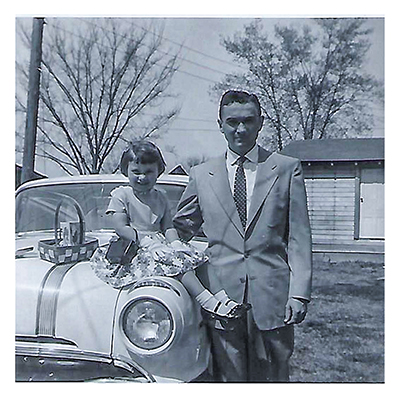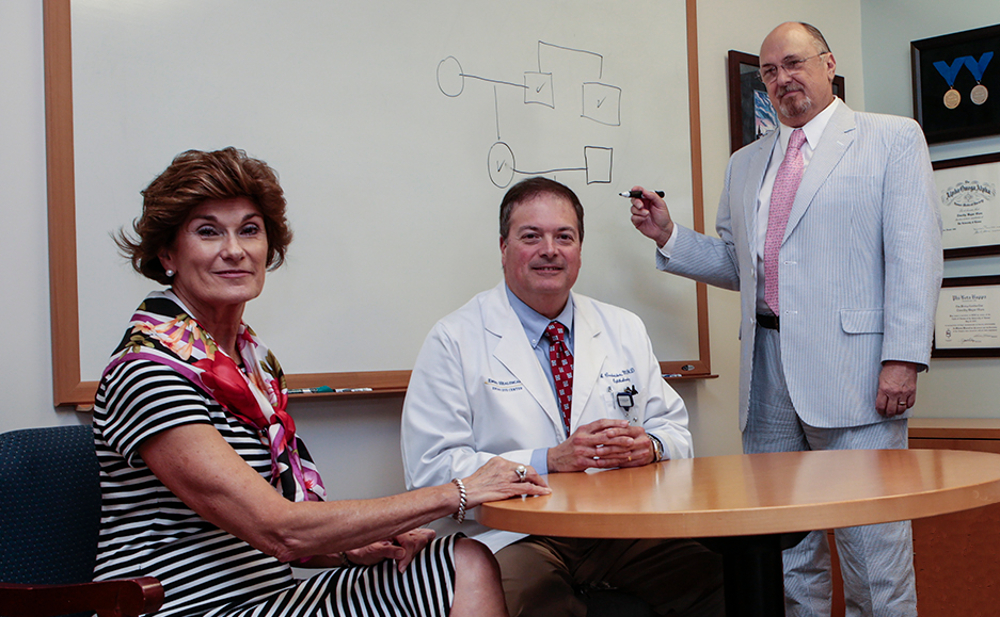
Debra Owens: Hard questions, a soft heart, and the compassion to put them both to work
When it comes to glaucoma, Debra Owens can give most first-year residents a run for their money. The CEO of the DRO Management Company is quick to rattle off facts about normal tension glaucoma (NTG), a chronic disease that causes vision loss by damaging the optic nerve.
Debra Owens is fighting that disease. And she's doing just fine - in part because she is, by nature, a tenacious investigator. And a velvet-gloved fighter. In her story we see a commitment to healing, teaching, and learning that inspires us to keep doing the same.
Long before she set foot into the Emory Eye Center, Debra Owens and her father, Don, both received treatment for their glaucoma from a private practice physician near their home. While Don had a tougher battle - he also had AMD - Debra's glaucoma appeared to be treatable with medicated eye drops. The drops she was prescribed - ophthalmic timolol - relied on beta blockers, a class of drugs that is also used to lower blood pressure.
Now timolol is usually one of the first go-to meds for glaucoma but it's not for everyone. It relieves some of the pressure that causes pain. Some patients who also have high blood pressure tolerate it well,
she said.
My Dad insisted we both switch to Emory Eye Center
My doctor needed to think outside that box on this one, because I am not like a lot of other patients. I didn't know it yet, but I had a less prevalent form of glaucoma called NTG [normal tension glaucoma]. People with NTG often start out with low blood pressure and a low heart rate. They are not good candidates for eye drops that contain beta blockers. Those timolol drops were lowering my blood pressure to a level that was approaching dangerous.
How did she learn all this?
My Dad insisted we both switch to Emory Eye Center for our eye care. It was farther away from home, but we knew we'd get the best care. On my very first visit, Dr. C [glaucoma specialist Anastasios Costarides MD] got straight to it. After taking my pulse and asking what glaucoma meds I'd been prescribed, he immediately made me promise to not take any more timolol drops, to stop completely,
said Owens.
The other doctor - the one my father and I had used for years - probably hadn't studied NTG. He just wanted to lower my ocular pressure. Dr. C wanted to lower that pressure, too, but when he saw how low my heart rate and blood pressure were, he found other ways to treat my glaucoma.
Going forward, Owens had a new relationship with her vision care. She was an active partner, not a treatment fact-checker. If she had a question, Dr. Costarides gave her answers that allowed her to make better, more informed decisions. And he was confident enough to welcome requests for second opinions.
Dr. C was just as eager as I was to get new perspectives,
she said. Every time I traveled - to New York, Philadelphia, and LA - he gave me the names of the top glaucoma specialists I could visit. He encouraged me to reach out.
(More than once, those specialists pointed Owens right back to Anastasios Costarides.)
Owens explains her persistence this way:
I have a detail-oriented mind and my eyes are how I take in a lot of those details. It was important to me that I know more about this disease. I wanted to know all about why NTG was different, and how to take care of it. I even volunteered to participate in a glaucoma research study that [Emory Eye Center scientist Dr.] Eldon Geisert was conducting.
Among her takeaways: as a person with NTG, her eye pressure numbers were within normal range. But people with NTG need lower-than-normal eye pressure numbers to avoid stressing their optic nerve. She needed to get her eye numbers down to about a 10 - a level that could not have been attained using the timolol.
I have lived with the consequences of blindness
Last year, Debra Owens opted to have a filtration device implanted to lower that pressure.
Things have looked pretty good since then, but I've learned enough to know that you can't obsess about this. You have to trust your physician, or it will consume you. Dr. C understands that, bless his heart. He told me 'Go live your life. Let me worry about this.' And I have found that was excellent advice
If that was the end of the story, we would happily count Debra Owens among the many Eye Center patients whose lives were not disrupted by a treatable vision disorder. They are very much a part of our history and our mission.
But Debra Owens herself was not done writing this story. She made two very generous donations that have allowed the Emory Eye Center to advance our mission. The first was to help glaucoma patients pay for their medications, which can cost upwards of $1000 a month.
Even if you are insured, it's very easy for someone with poor vision to run out of eye drops before the end of the month. It's very easy to spill them or to miss your eye when you are putting them in. And if that means you run out - and a lot of people run out- you have to self-fund additional meds. If you can afford it, that's one thing, but if you can't, that means you go without. I have empathy for anyone that happens to.
The second has supported Dr. Geisert's research on the genetic components of glaucoma. Debra Owens's voice gets just a little softer as she explains this part:
I am fortunate, but I am also aware. I've lived with the consequences of blindness. It shattered my Dad's world when he went blind. As his caregiver, I can never forget all the things he sorely missed simply because he could not see them. I have a lot empathy for anyone who has experienced the same, but I may never meet them to say as much. This is my way of honoring my Dad - and anyone who has suffered the threat of blindness
--Kathleen E. Moore
Learn more about the Emory Eye Center's history!


